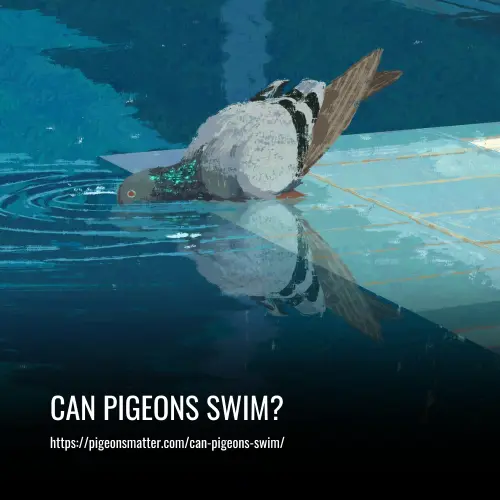Can Pigeons Swim?
This post contains affiliate links. As an Amazon Associate, we earn from qualifying purchases.
Pigeons are not able to swim, but this does not stop them from enjoying water. Despite their inability to swim, pigeons are not afraid of water and will actively seek out sources of water such as streams and springs.
They use water for various purposes, including drinking, bathing, and cleaning their feathers. Even though they cannot swim, pigeons are still drawn to water and will travel long distances to find it.

Reasons Why A Pigeon Can’t Swim
Pigeons cannot swim for two main reasons related to their body structure and lack of a water repellent layer.
1. Body Structure
Pigeons have a short body with a stubby neck, which makes it difficult for them to swim. Unlike ducks and swans, pigeons do not have webbed feet or toes, which are essential for efficient swimming. The absence of these adaptations makes swimming impossible for pigeons.
2. No Water Repellent Layer
Aquatic birds, such as ducks and swans, have a water repellent layer that keeps their feathers and bodies dry. This layer allows them to float effortlessly on the water’s surface. Pigeons, on the other hand, lack this water repellent layer, making it challenging for them to float and swim. They would quickly become soaked and exhausted in the water, preventing them from swimming effectively.
Do Pigeons Like Water
Yes, pigeons love water! They enjoy being near ponds, walls, rivers, swimming pools, and lakes. However, they do not go near the sea as the water is salty. Pigeons also love bathing as it helps them stay clean and odor-free.
You can often find them sitting by the water, playing around, and sprinkling water droplets. It’s quite entertaining to watch these city pigeons near fountains, amusing themselves and the people walking by.
Can Pigeons Float
Yes, pigeons can float on water. They have a unique physiology that allows them to expand their tail and open their wings, increasing their surface area and enabling them to float. They also dampen the upper part of their feathers to prevent themselves from drowning. However, they only float for a short period of time to avoid the risk of drowning.
Can A Pigeon Be Drowned
Pigeons can drown if they are in water for too long. When their feathers get soaked and heavy, it can make it difficult for them to stay afloat. Young pigeons are especially at risk because they can’t float as well as adults. However, adult pigeons may be able to struggle and eventually make their way out of the water, but it will be difficult for them.
Safety Precautions
Pools can be dangerous for pigeons as they can become tired and drown if they are unable to get out. Their wet feathers can weigh them down and make it difficult for them to escape. If you find a dead pigeon in your pool, it’s important to clean and disinfect the entire pool to prevent the spread of diseases.
Cleaning the pool thoroughly is necessary to ensure the safety of swimmers and prevent infections from the dead animal.
FAQs
Pigeons can fly when they are wet, but their flying ability is not as good as when they are dry. Like most birds, pigeons can still fly in the rain. However, their wings can become heavy and saturated with water, making it more difficult for them to fly and putting them at risk of being attacked by predators.
If a pigeon falls into water that is not too deep, it will try to wade out of it. However, if the water is over their head, they will struggle and eventually drown. Pigeons do not have webbed feet and their feathers lack the oils needed to make them water repellant.
When taking care of your pet pigeons in the water, it’s important to monitor their behavior and ensure their safety. For baby pigeons, pay special attention to their bathing and drinking habits. Make sure the water temperature is moderate to provide a comfortable bathing experience for the birds. After bathing, allow them to dry off properly before returning them to their living area.
Pigeons do not die in water. While they cannot swim like other birds, pigeons can float on water and be around it. They love bathing themselves and often take dips in lakes or rivers to stay hydrated and clean their feathers. Floating in water serves a dual purpose for pigeons, allowing them to quench their thirst and keep their bodies clean.
Yes, you can wash a pigeon if they have gotten themselves dirty. Use a shallow bowl or bathtub with water that is not too hot or too cold. After washing, wrap the pigeon in a soft towel to keep them warm until they dry. Keep in mind that pigeons may not enjoy being handled, but it is important to provide them with a water source for hydration, such as a birdbath or water bottle.
Conclusion
Pigeons cannot swim, but they do have the ability to stay afloat in water. It is not recommended to keep pet pigeons away from water, as it can create a fear of water in them. It is best to allow them to experience water and enjoy their time. Pigeons are intelligent animals and considered to be one of the smartest bird species, but swimming is not a natural skill for them.